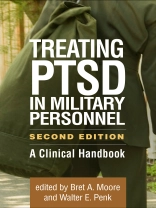This state-of-the-science guide to assessing and treating posttraumatic stress disorder (PTSD) in active-duty service members and veterans has now been extensively revised with 65% new material. Leading authorities review available evidence-based treatments, including individual, group, and couple and family therapy approaches. Knowledge about military culture, the stressors experienced by service members, and common challenges for both military and civilian practitioners is woven through the volume and reflected in the vivid case examples. Chapters on specific clinical issues delve into co-occurring affective, anxiety, substance use, and sleep disorders; treatment of particular types of trauma; suicide prevention; and more.
New to This Edition
*Chapters on additional treatments: mindfulness-based behavioral and cognitive therapies, stress inoculation training, cognitive-behavioral conjoint therapy, group therapy, and complementary and alternative therapies.
*Chapters on additional clinical issues: chronic pain, moral injury, complex traumatic stress disorders, and posttraumatic growth.
*Updated throughout with the latest treatment research and DSM-5 diagnostic changes.
Spis treści
Foreword, Matthew J. Friedman
Introduction: PTSD in the Military, Bret A. Moore & Walter E. Penk
I. Treatment Approaches for PTSD in Military Personnel
1. Understanding and Working within the Military Culture, Bret A. Moore
2. Issues in Assessment of PTSD in Military Personnel, Sunny Dutra, Jasmeet P. Hayes, & Terence M. Keane
3. Prolonged Exposure Therapy, Alan L. Peterson, Edna B. Foa, & David S. Riggs
4. Cognitive Processing Therapy, Amy M. Williams, Tara E. Galovski, & Patricia A. Resick
5. Eye Movement Desensitization and Reprocessing, Mark C. Russell, Howard Lipke, & Charles R. Figley
6. Mindfulness-Based Behavioral and Cognitive Therapies, Emily M. O’Bryan, Kristen M. Kraemer, Christina M. Luberto, & Richard Sears
7. Psychodynamic Psychotherapy, Harold Kudler & Russell B. Carr
8. Stress Inoculation Training: A Resilience-Engendering Intervention, Donald Meichenbaum
9. Cognitive-Behavioral Conjoint Therapy for PTSD: Theory and Practice of Couple and Family Interventions, Anne C. Wagner, Meredith S. H. Landy, & Candice M. Monson
10. Group Therapy for PTSD, Walter E. Penk, Dolores Little, & Nathan D. Ainspan
11. Psychopharmacological and Neuromodulation Treatment, William M. Sauvé & Stephen M. Stahl
12. Complementary and Alternative Therapies, Gary Elkins, Lynae Roberts, & Samuel Stork
13. Psychosocial Rehabilitation, Walter Penk, Dolores Little, & Nathan Ainspan
II. Specific Clinical Issues Associated with PTSD
14. Co-Occurring Affective and Anxiety Disorders, Eric C. Meyer, Nathan A. Kimbrel, Matthew T. Tull, & Sandra B. Morissette
15. Co-Occurring Substance Use Disorders, Marc I. Kruse, Tessa C. Denman, Alexia G. Maness, & Suzy Bird Gulliver
16. Chronic Pain and PTSD, John D. Otis
17. Traumatic Brain Injury, Jennifer J. Vasterling, Mieke Verfaellie, Susan M. Mc Glynn, & Vanessa D’Orio
18. Military Sexual Trauma, Nicholas D. Holder & Alina M. Surís
19. Sleep Disorders, William L. Brim & David S. Riggs
20. Managing the Service Member with Suicidal Ideation, Nancy A. Skopp, David D. Luxton, Nigel Bush, & M. David Rudd
21. Treating Moral Injury in Military Members and Veterans, Danielle S. Berke, Nora Kline, Jessica Carney, Julie D. Yeterian, & Brett T. Litz
22. Treating Complex Traumatic Stress Disorders in Military Veterans, Christine A. Courtois & Julian D. Ford
23. Identifying and Facilitating Posttraumatic Growth in Military Personnel, Cara L. Blevins, Taryn C. Greene, & Richard G. Tedeschi
Author Index
Subject Index
O autorze
Bret A. Moore, Psy D, ABPP, is a clinical psychologist and prescribing psychologist in San Antonio, Texas, and the Vice Chair of the Boulder Crest Institute for Posttraumatic Growth in Bluemont, Virginia. He is the founder of Military Psychology Consulting and a former active-duty Army psychologist and two-tour veteran of Iraq. Dr. Moore is author or editor of numerous books for mental health professionals and general readers. He is a Fellow of the American Psychological Association (APA) and a recipient of the Arthur W. Melton Award for Early Career Achievement in Military Psychology from APA Division 19 and the Early Career Achievement Award in Public Service Psychology from APA Division 18.
Walter E. Penk, Ph D, ABPP, is Professor of Psychiatry and Behavioral Sciences at Texas A&M College of Medicine and Consultant to Social and Community Reintegration Research at the Edith Nourse Rogers Memorial Veterans Hospital in Bedford, Massachusetts. He has served at VA Medical Centers in Houston, Dallas, Boston, and Bedford, and was Director of Psychological Services for the Massachusetts Department of Mental Health. Dr. Penk is a recipient of the Alfred M. Wellner, Ph D, Lifetime Achievement Award from the National Register of Health Service Psychologists; the Life Achievement Gold Medal for Practice in Psychology from the American Psychological Foundation; the Presidential Citation and the Harold M. Hildreth Distinguished Public Service Award from APA Division 18; and the Charles S. Gersoni Military Psychology Award from APA Division 19, among other honors. He has published more than 160 articles and several books.












